Related Research Articles

Frank Vincent Zappa was an American musician, composer, and bandleader. His work is characterized by nonconformity, free-form improvisation, sound experimentation, musical virtuosity and satire of American culture. In a career spanning more than 30 years, Zappa composed rock, pop, jazz, jazz fusion, orchestral and musique concrète works; he also produced almost all of the 60-plus albums that he released with his band the Mothers of Invention and as a solo artist. Zappa also directed feature-length films and music videos, and designed album covers. He is considered one of the most innovative and stylistically diverse musicians of his generation.
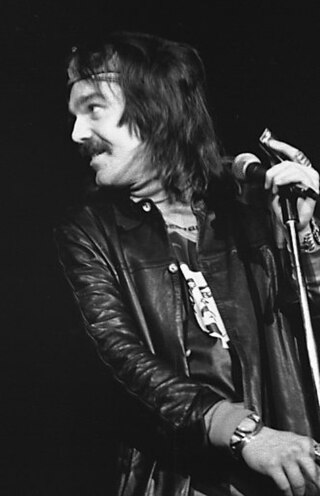
Don Van Vliet was an American singer, songwriter, multi-instrumentalist, and visual artist best known by the stage name Captain Beefheart. Conducting a rotating ensemble known as the Magic Band, he recorded 13 studio albums between 1967 and 1982. His music blended elements of blues, free jazz, rock, and avant-garde composition with idiosyncratic rhythms, absurdist wordplay, a loud, gravelly voice, and his claimed wide vocal range, though reports of it have varied from three octaves to seven and a half. Known for his enigmatic persona, Beefheart frequently constructed myths about his life and was known to exercise an almost dictatorial control over his supporting musicians. Although he achieved little commercial success, he sustained a cult following as an influence on an array of experimental rock and punk-era artists.

Dweezil Zappa is an American rock guitarist and occasional actor. He is the son of musical composer and performer Frank Zappa. Exposed to the music industry from an early age, Dweezil developed a strong affinity for playing the guitar and producing music. Able to learn directly from guitarists such as Steve Vai and Eddie Van Halen, Dweezil released his first single at the age of 12.

Joe's Garage is a three-part rock opera released by American musician Frank Zappa in September and November 1979. Originally released as two separate albums on Zappa Records, the project was later remastered and reissued as a triple album box set, Joe's Garage, Acts I, II & III, in 1987. The story is told by a character identified as the "Central Scrutinizer" narrating the story of Joe, an average adolescent male, from Canoga Park, Los Angeles, who forms a garage rock band, has unsatisfying relationships with women, gives all of his money to a government-assisted and insincere religion, explores sexual activities with appliances, and is imprisoned. After being released from prison into a dystopian society in which music itself has been criminalized, he lapses into insanity.

James Inkanish, Jr., known professionally as Jimmy Carl Black, was a drummer and vocalist for the Mothers of Invention.

Hot Rats is the second solo album by Frank Zappa, released in October 1969. It was Zappa's first recording project after the dissolution of the original version of the Mothers of Invention. Five of the six songs are instrumental; while "Willie the Pimp", features vocals by Captain Beefheart. In his original sleeve notes, Zappa described the album as "a movie for your ears".
Bizarre Records, self-identified simply as Bizarre, was a production company and record label formed for artists discovered by rock musician Frank Zappa and his business partner/manager Herb Cohen.

The Mothers of Invention was an American rock band from California. Formed in 1964, their work is marked by the use of sonic experimentation, innovative album art, and elaborate live shows.
Calvin "Cal" Schenkel is an American illustrator, graphic designer, animator and comics artist, specializing in album cover design.
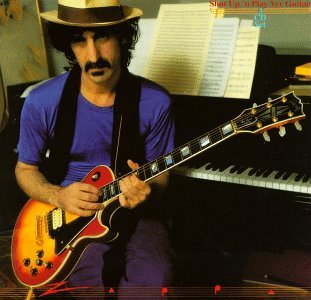
The project Shut Up 'n Play Yer Guitar consisting of Shut Up 'n Play Yer Guitar, Shut Up 'n Play Yer Guitar Some More and Return of the Son of Shut Up 'n Play Yer Guitar is a series of albums by Frank Zappa. The albums consist solely of electric guitar instrumentals and improvised solos (mostly) played live by Zappa and featuring a wide variety of backing musicians.

The Muffin Men are a British band, based in Liverpool, England, which primarily plays the music of Frank Zappa and The Mothers of Invention. The group formed in 1990, originally to play a one-off concert to celebrate Zappa's fiftieth birthday. Prior to the COVID-19 pandemic the band toured for thirty unbroken years around The UK, Europe and Scandinavia, performing Zappa's music as a tribute band, along with some of their own compositions. Until his death in 2008, the band often featured guest vocals and percussion by former Mothers of Invention drummer and vocalist Jimmy Carl Black, with whom they also performed songs by Captain Beefheart.
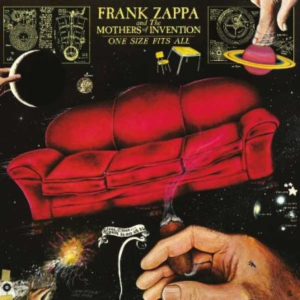
One Size Fits All is the fourteenth album by the Mothers of Invention, and the twentieth overall album by Frank Zappa, released in June 1975. A special four-channel quadraphonic version of the album was advertised but not released.
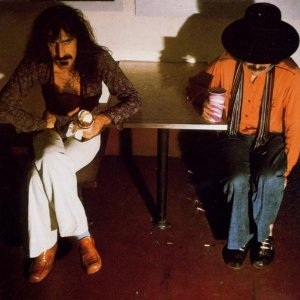
Bongo Fury is a collaborative album by American artists Frank Zappa and the Mothers, with Captain Beefheart, released in October 1975. The live portions were recorded on May 20 and 21, 1975, at the Armadillo World Headquarters in Austin, Texas. Tracks 5, 6 and 9 are studio tracks recorded in January 1975 during the sessions which produced One Size Fits All (1975) and much of Studio Tan (1978).

Napoleon Murphy Brock is an American singer, saxophonist and flute player who is best known for his work with Frank Zappa in the 1970s, including the albums Apostrophe ('), Roxy & Elsewhere, One Size Fits All, and Bongo Fury. He contributed notable vocal performances to the Zappa songs "Village of the Sun," "Cheepnis," and "Florentine Pogen."
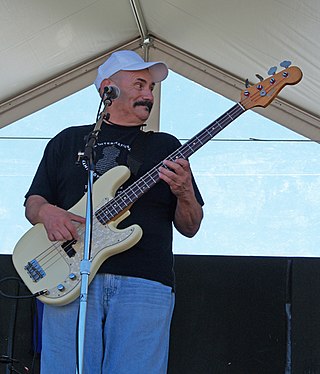
Roy Estrada is an American former musician and convicted sex offender. He is best known for his bass guitar work with Frank Zappa and the Mothers of Invention; for having been a founding member of Little Feat, playing on their first two studio albums; and for being a member of Captain Beefheart's the Magic Band.

Zappa Plays Zappa is an American tribute act led by Dweezil Zappa, the elder son of late American composer and musician Frank Zappa, devoted to performing the music of Frank Zappa.
"Willie the Pimp" is a song from Frank Zappa's 1969 album Hot Rats. It features an idiosyncratic Captain Beefheart vocal and one of Zappa's classic guitar solos. It is the only track that is not instrumental on the album, though the track features a long guitar solo.
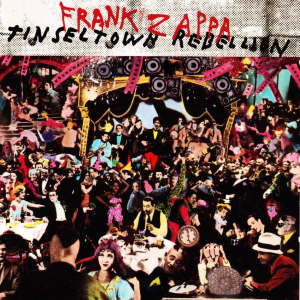
Tinsel Town Rebellion is a double live album released by Frank Zappa in May 1981. The album was conceived by Zappa after he scrapped the planned albums Warts and All and Crush All Boxes, and contains tracks that were intended for those albums.
"Advance Romance" is a Frank Zappa song originally from his live album with Captain Beefheart, Bongo Fury. Other versions of the song can be found on You Can't Do That on Stage Anymore, Vol. 3, You Can't Do That On Stage Anymore, Vol. 5, and Make a Jazz Noise Here. It is a humorous parody of typical love songs and is sung by Napoleon Murphy Brock with George Duke. The song was played from 1975 to 1976 and from 1982 to 1988 making the song one of Zappa's most performed. Almost all of Zappa's lineups after its release on Bongo Fury played this song in concert.
"The Torture Never Stops" is a song by Frank Zappa from the 1976 album Zoot Allures. Other versions appear on Zappa in New York, Thing-Fish, You Can't Do That on Stage Anymore, Vol. 1, You Can't Do That on Stage Anymore, Vol. 4, The Best Band You Never Heard in Your Life, FZ:OZ, Cheap Thrills, Buffalo, Philly '76, and Hammersmith Odeon.
References
- ↑ Couture, François. "Frank Zappa / Frank Zappa & the Mothers / Captain Beefheart / The Mothers of Invention - Muffin Man". AllMusic . Retrieved April 7, 2013.
- ↑ Lowe (2007)
- ↑ Brown and Newquist (1997), p. 84
- ↑ Quayle, Tom. "Dweezil Zappa Interview : VIVA ZAPPA!". iguitarmag.com. Retrieved 18 November 2015.
- ↑ Brown and Newquist (1997), p. 84
- Sources
- Prown, Pete; HP Newquist (1997). Legends of Rock Guitar: The Essential Reference of Rock's Greatest Guitarists. Hal Leonard Corporation. ISBN 0793540429.
- Lowe, Kelly (2007). The words and music of Frank Zappa. U of Nebraska Press. ISBN 978-0803260054.